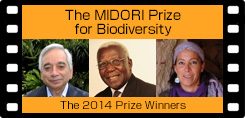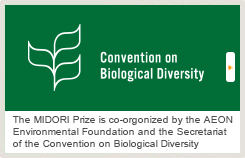The MIDORI Prize for Biodiversity 2014
-

- Kamal Bawa
- India
President, Ashoka Trust for Research in Ecology and the Environment (ATREE), India
Distinguished Professor, University of Massachusetts, Boston
- Dr. Bawa has achieved notable results in research on tropical forests. Through developing new methods and genetic markers he has shown that forest fragmentation, widespread in the tropics, depletes biodiversity. He has led research on conservation biology for many years, including on the extraction of non-timber products and on mainstreaming biodiversity into agricultural landscapes. He established the Ashoka Trust for Research in Ecology and the Environment (ATREE) as a research institution for biodiversity conservation and sustainable development. He has displayed operational leadership and integrally promoted research, education and implementation at the ATREE.
-

- Alfred Oteng-Yeboah
- Ghana
Chair, Ghana National Biodiversity Committee
- Dr. Oteng-Yeboah is a leader of biodiversity representing Africa. He has held several important positions at international institutions including Chair of the Subsidiary Body on Scientific, Technical and Technological Advice (SBSTTA). He has led international negotiations on biodiversity from a global perspective and had a worldwide impact. Especially, he has made significant contributions in the establishment and management of the Intergovernmental Science-Policy Platform on Biodiversity and Ecosystem Services (IPBES) through advocating the importance of dialogues between science and policy.
-

- Bibiana Vilá
- Argentina
Director, Vicuñas, Camelids and Environment (VICAM)
Principal Researcher, National Research Council (CONICET) Argentina
- Regarding the conservation of wild vicuñas in the Andean altiplano, Dr. Vilá has led the implementation of conservation measures integrating both traditional knowledge of indigenous communities and modern science including ecology, ethology and animal welfare. Also, she has made significant contributions by integrally promoting support to local communities and the implementation of environmental education. This has been achieved through the sustainable use of economically high-value vicuña fiber, realizing both the conservation of wild animals and the stable development of regional communities, and through leading a local-based and globally important project.













